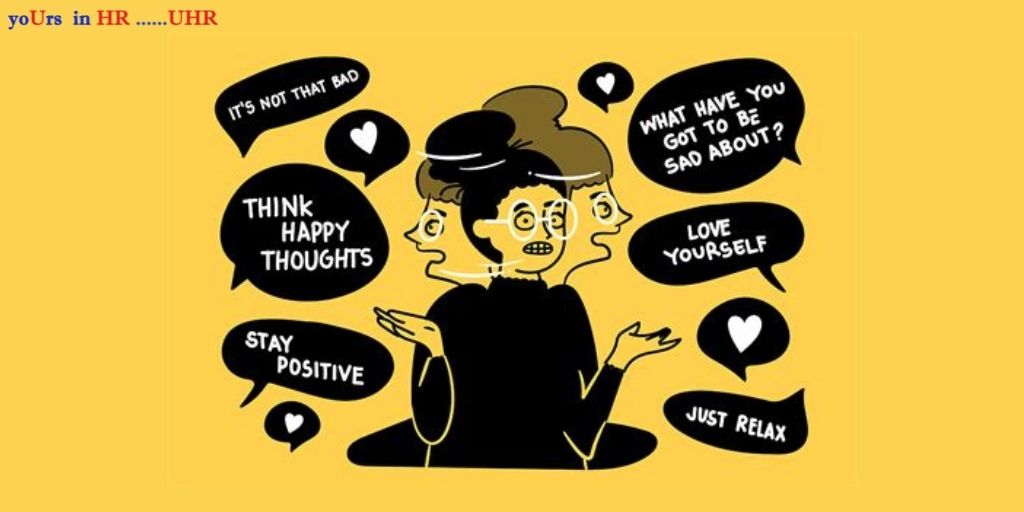
A positive attitude, as we have talked about in our earlier posts almost always gets one through. It is important to always find the silver lining on stormy clouds. But is there such a thing as excessive positivity? Can an excess of positivity make one unproductive? Is it possible to overdo the positive attitude and end up achieving the opposite of what set out to achieve?
In any context, even the professional, it is important to acknowledge the full range of human experiences. We have an older article written about using humour at workplace, and how that is a much-needed cheer amidst the straight-faced and formal professional world, a much-needed human touch. Humour humanises leaders, and alleviates stressful situations at workplaces. Why? Because it acknowledges the full range of human emotions and psychological states.
Similarly, negative emotions also need to be acknowledged. It is one thing to find the positives in a negative situation, and it is a different thing to not even acknowledge that something is wrong, that something needs to be fixed. There are times that it is better to let people express the negative emotion instead of trying to sweep it under the positivity carpet.
Take this scenario given here, in article by Growth Partners Consulting:
Michael works for a boss that seemingly refuses to acknowledge how bad their work environment has become. He has tried to discuss it with his boss but feels dismissed. She seems to ignore the problems and spins everything into a positive, “This is such a great growth opportunity! Let’s focus on what we’re learning.” or “Hey. Cheer up! At least we have jobs, right?” or “Look on the bright side. Everyone is working hard and that means they’re committed. Thank you for all you do.”
Michael feels his boss is ignoring reality. It’s nice that she thanks him, but it feels hollow, and his concerns trivialized. Her optimism doesn’t help, and his frustration is building.
Here, in this scenario, the constant positive attitude is actually leading to frustration and demotivation!
Wellness and mental-health jargon often calls this forced attitude of positivity as ‘toxic positivity’. Let us thus see why it is sometimes necessary to acknowledge the negatives and what should one do when faced with stormy clouds and the option to look for silver linings is not exercisable.
Problem-Solving Needs Acknowledging the Problem:
In the example given above, it would be much better if the said boss acknowledged that the work environment needs improvement instead of telling everyone to ‘cheer up’. Constantly looking at the positive side might hinder the view of the bigger picture. How does one focus on the ‘growth opportunity’ as she mentions, if we do not even acknowledge what is it that we need to grow beyond?
It is About Making People Feel Heard:
Making people feel heard isn’t always limited to ideas and brainstorming. It isn’t always about getting everyone participate to in a meeting or getting everyone’s perspective about major company decisions. Making people feel heard is also about providing an environment where employees and co-workers feel safe in giving feedback which might be a bit unpleasant or leaning on the negative side. It is also about letting one articulate their sadness, discomfort, dissatisfaction, disagreement and grievances in a way that will help them get around it.
So, what should be done?
The article cited above goes on to list out some ideas one can adopt instead of sweeping the negative emotion under the positivity carpet. Listening first and resisting the urge to solve everything right away is one approach mentioned. Listening makes sense, but wait, resisting the urge to solve?
How does one solve problems if we resist the urge to solve? The catch is to facilitate problem solving. Sometimes, people do not even want solutions, especially when the negative emotions are stemming from a tragic life event- they just want an acknowledgement of the problem and an acceptance of reality.
When faced with a dialogue and conversation about something negative, it is best to listen, ask questions which makes one feel heard and, in the process, arrive at possible ‘solutions’ instead of straight up ‘offering’ a solution always. Questions like:
- What would be helpful to you?
- What is the most realistic next step that would be helpful to you?
As Organisational psychologist Adam Grant sums it all up in a Tweet,
‘Pressuring people to be positive turns emotional intelligence into emotional labour. Toxic workplaces police people’s emotions. Healthy workplaces offer freedom of emotional expression. Showing stress or sadness isn’t unprofessional. It’s human.’

